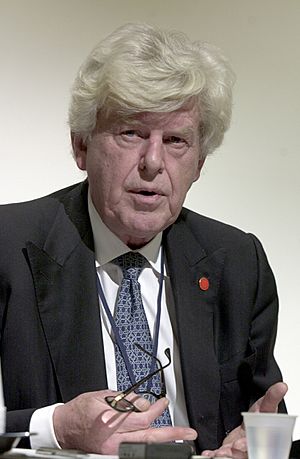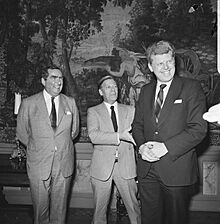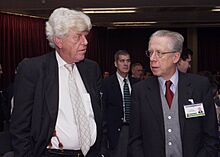Wim Duisenberg facts for kids
Quick facts for kids
Wim Duisenberg
|
|
|---|---|

Duisenberg in 2001
|
|
| President of the European Central Bank | |
| In office 1 June 1998 – 31 October 2003 |
|
| Vice President | Christian Noyer Lucas Papademos |
| Preceded by | Position established |
| Succeeded by | Jean-Claude Trichet |
| President of the European Monetary Institute |
|
| In office 1 July 1997 – 1 June 1998 |
|
| Preceded by | Alexandre Lamfalussy |
| Succeeded by | Position abolished |
| President and Chairman of the Bank for International Settlements |
|
| In office 1 January 1994 – 1 July 1997 |
|
| General-Manager | Andrew Crockett |
| Preceded by | Bengt Dennis |
| Succeeded by | Alfons Verplaetse |
| In office 1 January 1988 – 31 December 1990 |
|
| General-Manager | Alexandre Lamfalussy |
| Preceded by | Jean Godeaux |
| Succeeded by | Bengt Dennis |
| President of De Nederlandsche Bank |
|
| In office 1 January 1982 – 1 July 1997 |
|
| Preceded by | Jelle Zijlstra |
| Succeeded by | Nout Wellink |
| Member of the House of Representatives |
|
| In office 16 January 1978 – 28 June 1978 |
|
| In office 8 June 1977 – 8 September 1977 |
|
| Parliamentary group | Labour Party |
| Minister of Finance | |
| In office 11 May 1973 – 19 December 1977 |
|
| Prime Minister | Joop den Uyl |
| Preceded by | Roelof Nelissen |
| Succeeded by | Frans Andriessen |
| Personal details | |
| Born |
Willem Frederik Duisenberg
9 July 1935 Heerenveen, Netherlands |
| Died | 31 July 2005 (aged 70) Faucon, France |
| Cause of death | Drowning |
| Political party | Labour Party (from 1959) |
| Spouses |
Tine Stelling
(m. 1960; div. 1980)Gretta Nieuwenhuizen
(m. 1987) |
| Children | Pieter Duisenberg (born 1967) one other son and daughter |
| Alma mater | University of Groningen (BEc, M.Econ, PhD) |
| Occupation | Politician · civil servant · Economist · Researcher · Businessperson · Banker · Corporate director · Author · professor |
| Signature |  |
Willem Frederik "Wim" Duisenberg (born 9 July 1935 – died 31 July 2005) was a Dutch politician and economist. He is best known for being the first President of the European Central Bank (ECB). He held this important role from June 1998 to October 2003. He was a member of the Labour Party.
Duisenberg studied Economics at the University of Groningen in the Netherlands. He later worked as a researcher and earned his PhD in Development economics. He also worked as a financial expert for the International Monetary Fund (IMF). Later, he became an economist for the Dutch central bank. Before entering politics, he was a professor of Macroeconomics at the University of Amsterdam.
In 1973, Wim Duisenberg became the Minister of Finance for the Netherlands. After this, he took a break from politics and worked in banking. In 1982, he became the President of the Dutch Central Bank. His work there helped make the Dutch economy strong. In 1997, he became the head of the European Monetary Institute (EMI). This organization later became the European Central Bank.
Wim Duisenberg was known for being a skilled manager and a good negotiator. He believed in careful spending by governments and strong rules for banks. He passed away in 2005 at the age of 70. He was the youngest person to ever serve as the Dutch Minister of Finance.
Contents
Early Life and Education
Willem Frederik Duisenberg was born on 9 July 1935. His hometown was Heerenveen in the Frisian region of the Netherlands. His father, Lammert Duisenberg, worked as a waterworks supervisor. His mother was Antje Ykema.
He went to primary school and then secondary school in Heerenveen. In 1954, he moved to Haren. From 1954 to 1961, he studied at the University of Groningen. He earned his master's degree in economics with high honors. His main focus was on international relations.
In 1959, he joined the Labour Party. In 1960, he married Tine Stelling. He earned his PhD in 1965. His research was about the economic effects of disarmament.
Working in Government and Banking
After his studies, Duisenberg worked for the International Monetary Fund in Washington, D.C. He then became an advisor at the Dutch central bank in Amsterdam. Later, he became a professor at the University of Amsterdam. There, he taught about how large economies work.
From 1973 to 1977, Duisenberg served as the Minister of Finance for the Netherlands. After this, he worked as a vice president at Rabobank, a Dutch bank. In 1982, he became the director of the Dutch central bank. He was its president until 1997.
During his time at the Dutch central bank, he was very careful with money matters. He made sure the Dutch currency, the guilder, was closely linked to the strong German currency. This helped the Dutch economy. He was even called "Mr. Fifteen Minutes." This was because he quickly followed any interest rate changes made by the German central bank.
Leading Europe's Money
Because of his success with money policy, Wim Duisenberg became well-known in Europe. In 1998, he was chosen to be the first president of the new European Central Bank (ECB) in Frankfurt. This was a very important job.
During his time at the ECB, Duisenberg was known for his careful approach to money. He worked hard to protect the new European currency, the euro, in its early years. He sometimes kept interest rates higher than some people wanted. This was to fight inflation, which is when prices go up too much. He famously said, "I hear, but I don't listen" to those who wanted lower rates.
Duisenberg believed that European governments needed to make changes to their economies. He thought this would help them grow more. He announced he would retire on his 69th birthday in July 2003. However, he stayed in office a bit longer. He waited until Jean-Claude Trichet could take over as the next president. Trichet became president of the ECB on 1 November 2003.
Later Life and Passing
After retiring from the European Central Bank, Duisenberg continued to be active. He served on various government committees. He also spoke out about important financial topics. He supported balanced government budgets and strong rules for banks. He also believed in more cooperation among European countries.
Wim Duisenberg passed away in 2005 at the age of 70. He was on vacation at his home in Faucon, France. He suffered a heart attack and drowned in his swimming pool. A service was held for him in Amsterdam. He was buried in the Zorgvlied cemetery in Amsterdam.
Awards and Honors
Wim Duisenberg received several important awards and honors during his life:
- Order of the Netherlands Lion (Netherlands)
- Knight (1978)
- Commander (1997)
- Commander of the Order of Orange-Nassau (Netherlands)
- Knight Grand Cross of the Order of Isabella the Catholic
- He received an honorary doctorate in Economics from the University of Amsterdam in 2001.
See also
 In Spanish: Wim Duisenberg para niños
In Spanish: Wim Duisenberg para niños
- Delors Committee



